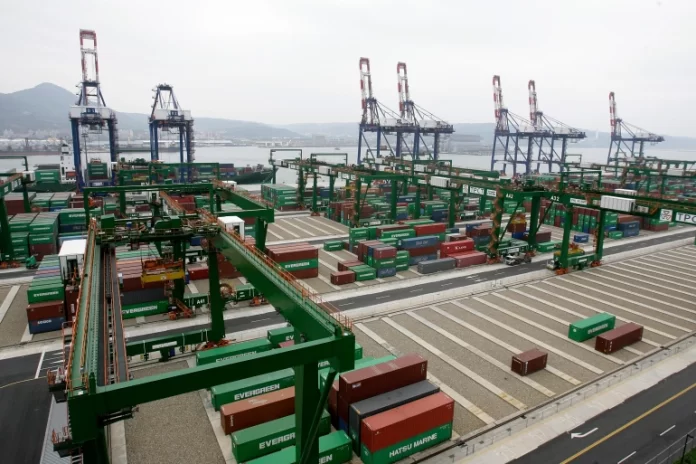China has suspended some trade with Taiwan in apparent retribution for a visit by the US House Speaker Nancy Pelosi to the self-governing island.
The curbs include the suspension of some fruits and fish imports from Taiwan, and exports of natural sand to the island.
China is Taiwan’s largest trading partner, with bilateral trade worth $273 billion last year, accounting for 33% of the island’s total trade with the rest of the world, according to the Taiwanese government.
Experts are also concerned about the impact escalating tensions between Taipei and Beijing may have on Taiwan’s semiconductor industry.
The self-governed democratic island of 24 million people is a global leader in the supply of semiconductor chips, which are a vital component for virtually all modern electronics, from cars to refrigerators to mobile phones.
China’s Taiwan Affairs Office said Wednesday that it would suspend imports of grapefruit, lemons, oranges and other citrus fruits, as well as chilled white striped hairtail and frozen horse mackerel from Taiwan.
In a separate statement, Chinese customs officials said the import suspension of citrus fruit is a result of “pest control” and “excessive pesticide residues,” and cited “Covid prevention” for the suspension on seafood imports.
China’s commerce ministry, meanwhile, suspended exports of natural sand to Taiwan, a key component for the production of semiconductor chips.
“Nancy Pelosi’s visit to Taiwan has triggered the expected ire of Chinese authorities,” said analysts from ING Group on Wednesday.
In response, Taiwan officials said China’s sand export suspension would have a “limited” effect and that Chinese sand accounts for “less than one percent” of its total demand.
China has previously banned imports of some Taiwanese products amid escalating tensions. Last year, China banned imports of pineapples from the island followed by some types of apples later in the year citing “pest control.” Earlier this year, it also banned Taiwanese grouper fish, a high-value seafood product from Taiwan, citing detection of some banned drugs.
Beijing’s recent announcements coincide with Pelosi’s trip to Taiwan, the first visit by a sitting speaker in 25 years, and after Beijing issued stern warnings that it would take countermeasures in retaliation.
The country’s military said after Pelosi’s visit that it was launching a series of “targeted military operations to counteract the situation.”
At a press briefing on Wednesday, a spokesperson for China’s Ministry of Foreign Affairs said that “the US and Taiwan separatist forces must take the responsibility and pay the price for the mistakes they made.”
Her comments came after she was asked whether the latest export suspension are intended to punish Taiwan for Pelosi’s visit, which she declined to answer directly, saying “please ask relevant department in charge.”
Pelosi’s visit comes at a tense moment for China.
The Communist Party will undergo a leadership reshuffle at its 20th party congress this fall. President Xi Jinping is expected to seek a historic third term in power at the meeting.
Domestic tensions are high as the country’s economy has slipped to the lowest growth in more than two years amid rigid Covid lockdowns and a slumping property market.
Youth unemployment has soared to the highest on record. Social protests are rising because of a nationwide mortgage crisis and a series of rural bank scandals.
Impact on global supply chains
Traders and analysts are worried about an escalation in China-Taiwan tensions and their impact on the global supply chain and inflation outlook.
Global markets tumbled Tuesday, with major stock indexes closing in the red and safe-haven currencies surging. On Wednesday morning, Asian markets rebounded a bit, but risk sentiment remains muted.
“China’s response to Pelosi’s trip to Taiwan could have an impact on supply chains and demand, which could keep the inflationary pressures going strong,” said Edward Moya, senior market strategist for Oanda, on Wednesday.
Global supply chains have already been rattled by the pandemic and the war in Ukraine. The World Bank said recently that many countries are experiencing double-digit inflation.
Any conflict in Taiwan, which is key in supplying the world with semiconductors, could exacerbated the global chip shortage that has already strained the global auto industry.
The Taiwan Strait is also an important shipping lane for vessels carrying goods between Asia and the West.
READ ALSO: U.S’ Pelosi meets Taiwan’s president and praises the island’s resilience
Taiwan Semiconductor Manufacturing Company is the world’s largest contract manufacturer of chips and plays a critical role in powering products designed by tech companies like Apple, Qualcomm and Nvidia.
In an interview with CNN this week, TSMC chairman Mark Liu said a war between China and Taiwan would make everyone lose. “If you take a military force or invasion, you will render TSMC factory not operable,” he said.
TSMC is one of Asia’s most valuable companies, and accounts for 90% of the world’s super-advanced chips.
Eurasia Group analysts, meanwhile, expected Beijing to conduct an “unprecedented” show of military force in the Taiwan Strait, along with cyberattacks, economic sanctions, and diplomatic protests.
“The immediate effect on clients will be a moderate but likely temporary disruption of supply chains that traverse the waters around Taiwan, as planes and ships reroute to avoid [People’s Liberation Army] exercises,” they said in a report on Wednesday.
“The lasting impact” will depend on the duration and intensity of the episode, though at the very least it will prompt further planning and contingencies around supply chain disruptions, including for semiconductors, by firms and policymakers, they added.
“The potential for crisis may not abate soon,” they said, adding that China could unveil further responses in coming days, weeks, and even months as the 20th party congress approaches.
Click Here to Read The Original Post













